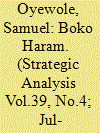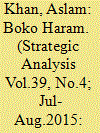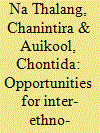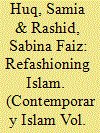|
|
|
Sort Order |
|
|
|
Items / Page
|
|
|
|
|
|
|
| Srl | Item |
| 1 |
ID:
139297


|
|
|
|
|
| Summary/Abstract |
The Boko Haram insurgency has emerged as one of the greatest threats to human security in Africa, and the Lake Chad region in particular. This is a region with a total area of 427,500 km2, which covers/ Cameroon, Chad, Niger and Nigeria. The movement known as Boko Haram (Western education is forbidden) originated in Nigeria in 2002. The official name of the movement is Jama’atu Ahlis Suna Lidda’awati Wal Jihad (People Committed to the Propagation of the Prophet’s Teachings and Jihad). The group was formed on the charismatic preaching of Yusuf Muhammad, which attracted hundreds of thousands of followers across northern Nigeria, Cameroon, Niger and Chad. The group’s campaign is informed by Islamic revivalism, widespread poverty, political corruption, repression and a weak justice system in the region.
|
|
|
|
|
|
|
|
|
|
|
|
|
|
|
|
| 2 |
ID:
139298


|
|
|
|
|
| Summary/Abstract |
Nigeria is currently going through a very delicate phase. The kidnapping of more than 275 Chibok schoolgirls by the terrorist organisation Boko Haram shocked not only Nigeria but the international community at large. This act by Boko Haram was widely criticised and led to worldwide condemnation and an international rescue effort. More seriously, the group leader Shekhau threatened to sell the girls into slavery and used Islamic teachings as justification.
|
|
|
|
|
|
|
|
|
|
|
|
|
|
|
|
| 3 |
ID:
137521


|
|
|
|
|
| Summary/Abstract |
The conflation of ethnic and religious identities, particularly that of Malay and Muslim, has long historical and political roots in Malaysia. Being one of the most safeguarded identity marks in Malaysia, Islam has become part of the core of Malay ethnicity and plays a prominent role in ethnic politics. Muslim converts from ethnic minorities, such as the Chinese and Indians, are therefore faced with social expectation and pressure to ‘become Malay’. This paper discusses the difficulty and improbability of Chinese Muslim identity in the previous literature and the recent development that enables the decoupling of religious and ethnic identities. By looking beyond ethnicity, the most salient social divider in Malaysia, and looking into other possibilities, such as religious identity, this paper aims to paint a picture of social relations and identification that is more complex yet flexible amongst the Chinese Muslim converts in Penang.
|
|
|
|
|
|
|
|
|
|
|
|
|
|
|
|
| 4 |
ID:
056163


|
|
|
| 5 |
ID:
165139


|
|
|
|
|
| Summary/Abstract |
As the conflict in Thailand’s southern border provinces shows no signs of abating, this article examines why Malay Muslims have managed to co-exist alongside the Thai Buddhists and the Sino-Thai population. Based on fieldwork, this article argues that while various factors have hardened ethno-religious identities and strengthened boundaries between ‘the other’ which in turn have affected inter-ethnic relations, a variety of opportunities for civic engagement has served to counter the prospect of ethnic relations erupting into communal violence.
|
|
|
|
|
|
|
|
|
|
|
|
|
|
|
|
| 6 |
ID:
081749


|
|
|
|
|
| Publication |
2008.
|
| Summary/Abstract |
This paper attempts to explore the development of Islamic identity of a group of elite women in Dhaka, Bangladesh. These women constitute a significant group in the country where 10% of the rich control 40% of the national wealth, and the 10% of the poorest control 1.84% of the national wealth.* Socially, politically and economically, elite women and their families are powerful and have access to resources and political influence. Many of these women who did not grow up with a very strict religious orientation came to Islam and consolidated religious thoughts and practices through a weekly Quran reading class. This particular Quran class began in 2002. The classes were initiated by a foreign diplomat's wife who was Muslim, and have continued even after her departure from the country in 2004. While Dhaka houses many meetings of Muslim men and women to discuss Islamic ideas and practices, this particular class was quite unique in its ability to attract and convert elite women whose lives were seemingly perfect. This urban elite phenomenon of Islamic revivalism has not been the subject of any in-depth research in Bangladesh, and this work therefore, is the first of its kind and largely introductory
|
|
|
|
|
|
|
|
|
|
|
|
|
|
|
|
|
|
|
|
|